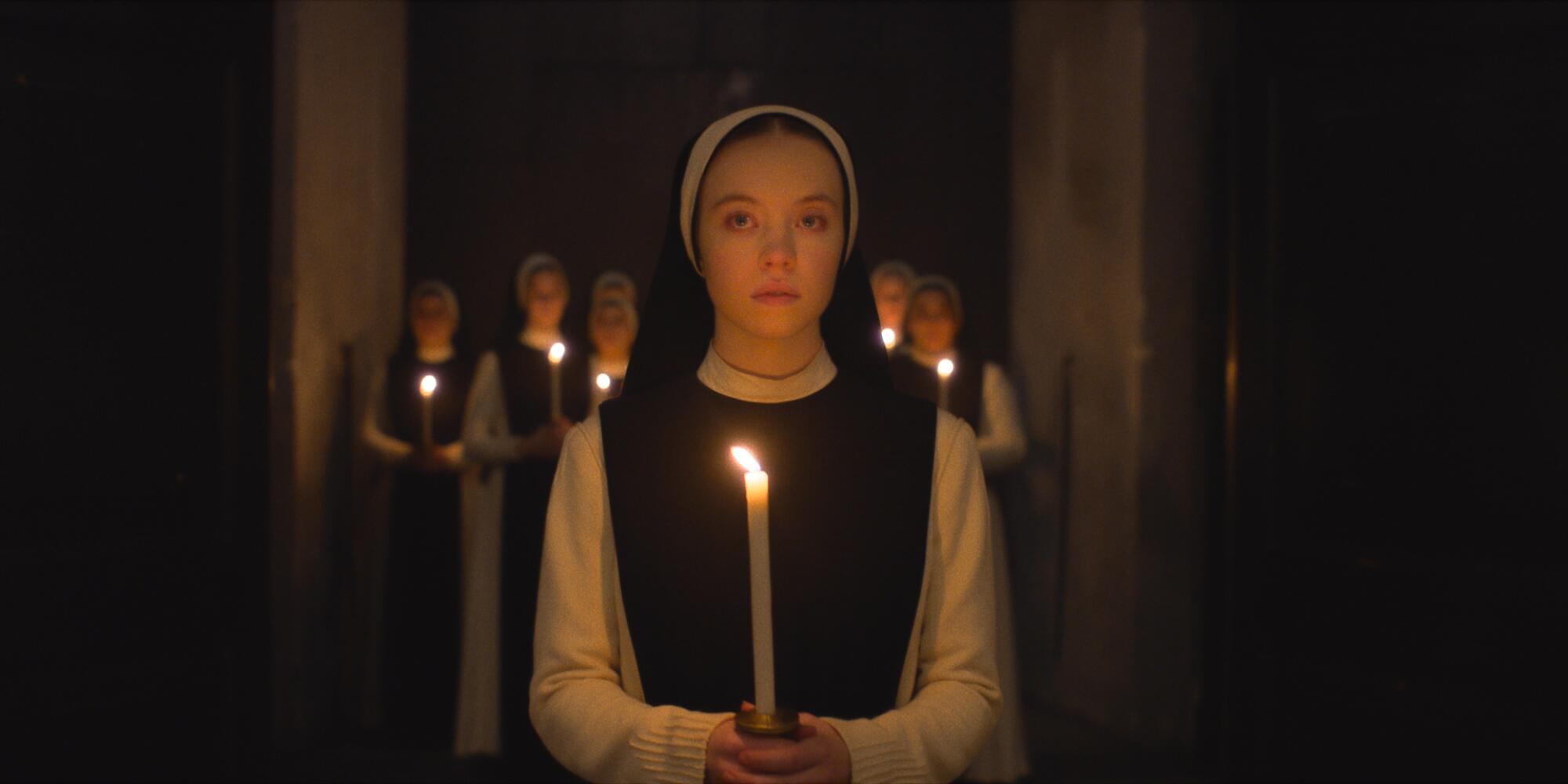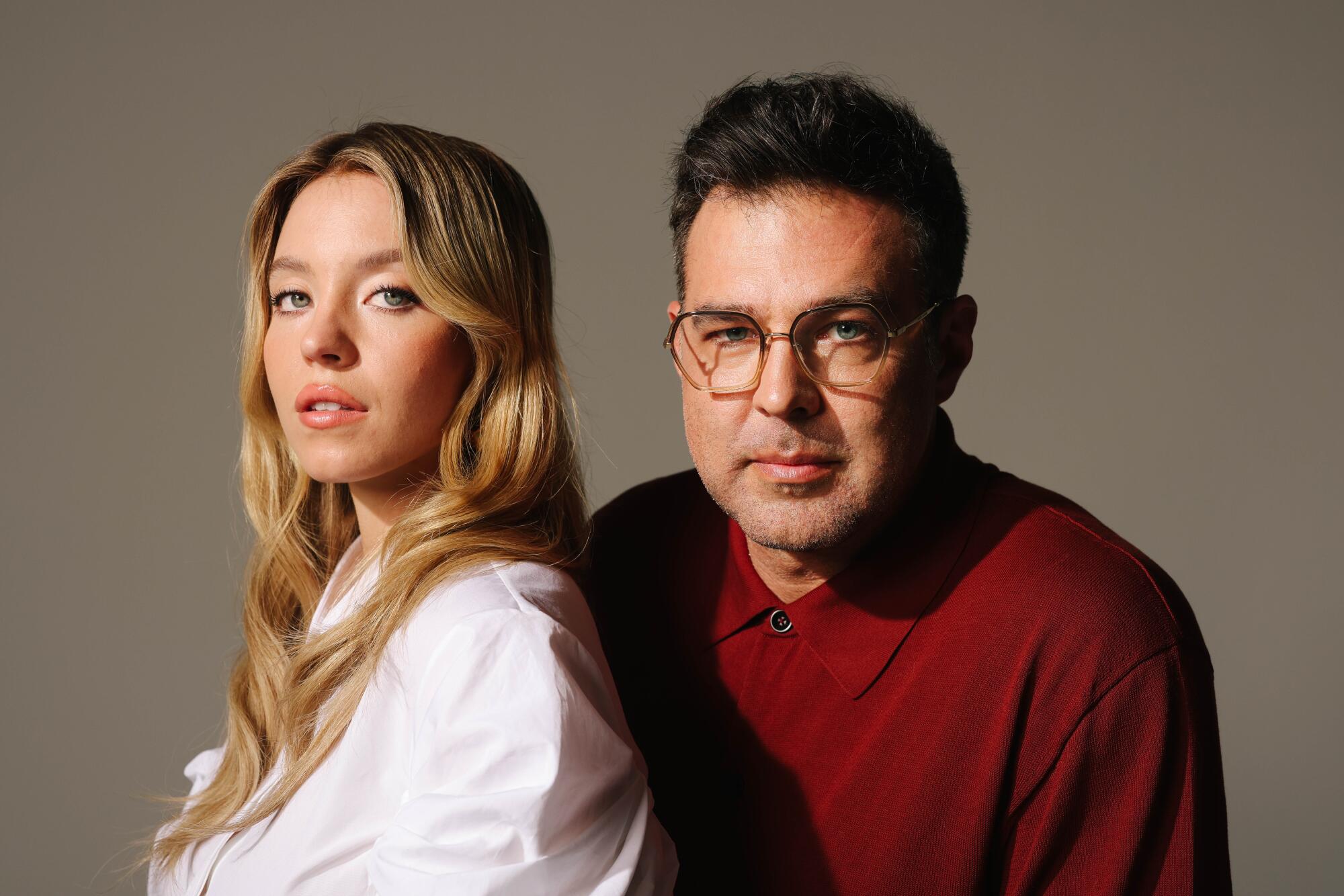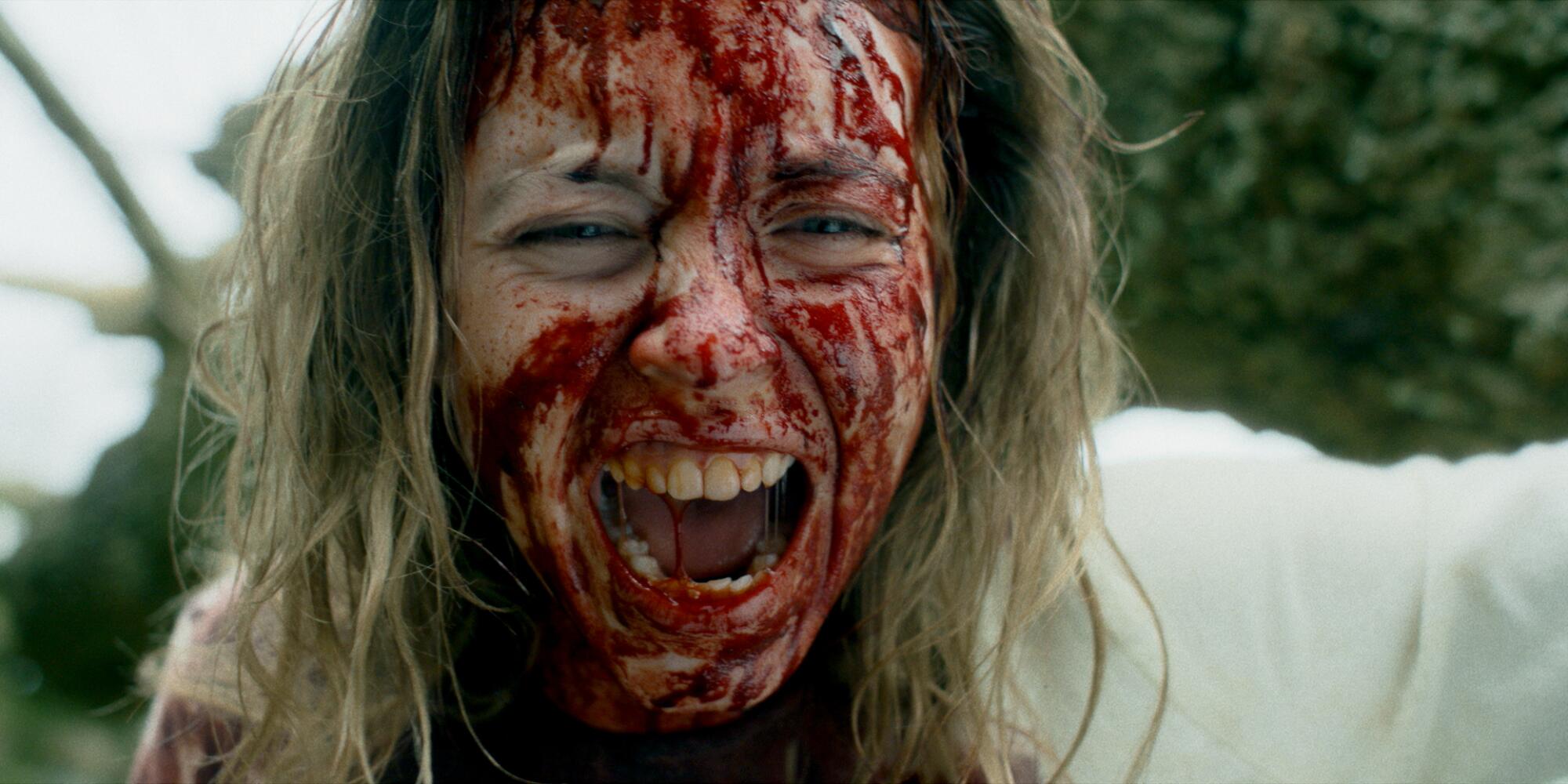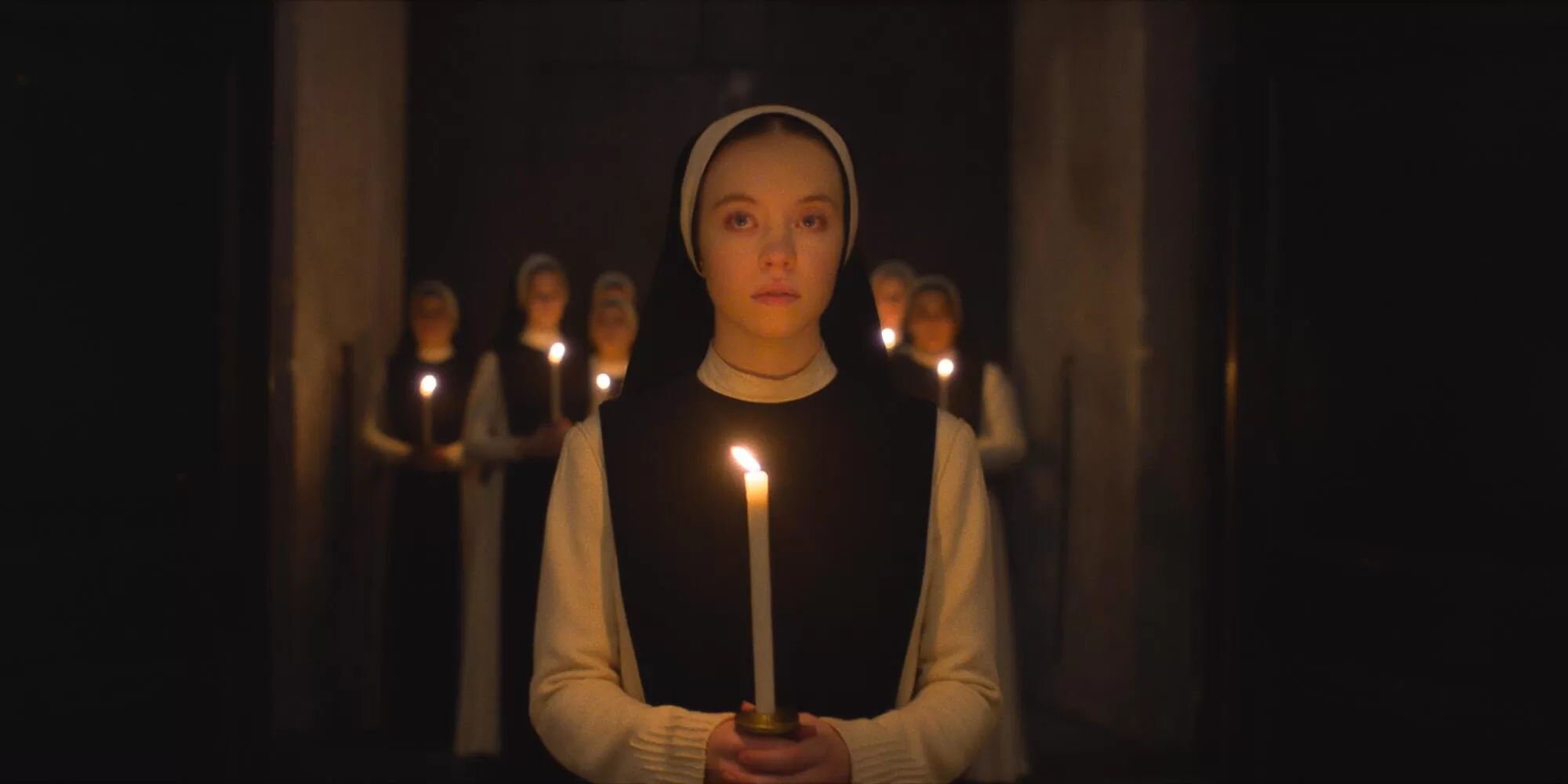Such is Sweeney’s current career trajectory that she is unfazed by the severe, mocking response to the recent disappointment “Madame Web,” saying, “I was just hired as an actress in it, so I was just along for the ride for whatever was going to happen.”
Now comes her intense horror film “Immaculate,” premiering Tuesday night at the South by Southwest Film and TV Festival, with Sweeney again starring and producing. The thriller reunites her with director Michael Mohan, the two having previously worked together on the Netflix high school dramedy series “Everything Sucks” and the Prime Video erotic thriller “The Voyeurs.”
“Immaculate,” with a screenplay credited to Andrew Lobel, follows a devout American woman, Cecilia, who makes her way to a remote Italian convent. She becomes pregnant while still a virgin — a seemingly miraculous event that soon takes a sinister turn. Mohan cites classics such as “Rosemary’s Baby,” “The Exorcist” and Ken Russell’s 1971 “The Devils” as inspirations; his film also features a supporting cast of European talent such as “Money Heist’s” Álvaro Morte, “White Lotus’ ” Simona Tabasco and “Amanda’s” Benedetta Porcaroli.
Sweeney, 26, recently hosted “Saturday Night Live”, only to be in Paris by Tuesday for a Miu Miu fashion show and then back in New York on Wednesday to join Mohan via Zoom for our joint interview. Just a few days later she was in Los Angeles for the Vanity Fair post-Oscars party, where she wore a dress previously worn by Angelina Jolie to the 2004 Academy Awards.
“Immaculate” will be released later this month by Neon. Though the following conversation does touch on the movie’s startling ending, there are no spoilers beyond anything that’s already in the film’s trailer.

(Neon)
Sydney, it’s already part of the origin story of “Immaculate” that you auditioned for this 10 years ago and then revived the project. What was it about this story that stuck with you?
SWEENEY: Originally the script was vastly different. Once I got my hands on it and we hired Michael, we drastically revised it so that it could fit who I am today and the world today. But the through line of the story always has stayed the same. And I think one of the reasons I loved it so much was that some of the scariest and most raw, guttural moments in this movie are in real life.
You and Michael had a working relationship already, but what made you turn to him to be involved?
SWEENEY: I feel like we have grown up in this industry together. Michael was one of the first filmmakers to actually believe in me to be able to have a regular role on a TV show. And I was 19 years old. After working on “Everything Sucks” and “Voyeurs,” you can just communicate with someone differently. Mike and I can just look at each other and we know what we’re thinking. We know what needs to be fixed. We know what’s working without even having to say a word. And having a filmmaker like that on your team is so beneficial to having a project just flow. And it was also my baby and I knew that he wasn’t going to come on and then push me aside.
Michael, what was your reaction when you first got the script?
MOHAN: I was terrified to read it. I knew Syd was making this movie with or without me. And we had shared some scripts before and some of the scripts that I had read I didn’t feel like I was uniquely suited to. And I didn’t want to just sign on just to sign on. I wanted to feel like I could elevate what was there. And when I read the script, the concept just felt so plausible and it felt very terrifying and prescient. The twist that the narrative takes I didn’t see coming. As someone who writes movies with twist endings, that’s a big deal.
But also, I just really wanted to work with Syd again. It’s just so easy. I don’t want to deconstruct it too much. It’s this appreciation for the craft of our crew and what they bring to it.
How did the script change from what it originally was?
SWEENEY: It drastically changed — location, age, characters, a lot of it.
MOHAN: The main thing was, in the early draft, she was a high school student. And so by changing the character to a nun, it gave us a much broader character arc to play. Even though the movie’s really short, she starts in one place that is so vastly different from where we leave her. And knowing that you’ve got an actor as good as Syd in your back pocket to perform it, she’s going to be able to accomplish it effortlessly. I just have to keep her in focus.
Anytime I would come up with a new idea, they would just immediately go, “But is it scary?” And their whole thing was just: This needs to be really scary. And I give them all the credit for pushing me in all the right ways.
Sydney, talk about your move into producing. Is this about you taking more control of the material you’re agreeing to be a part of?
SWEENEY: I am a very hands-on collaborator. I like being able to give ideas, be a part of it, help come up with solutions. It just changes the whole process. It’s so hard for me now to be on a set and not be able to help in any type of way and be able to take action. And being able to actually have a voice and have a valued opinion — it means so much.
And I still have a billion things to learn, but I love being able to be a part of the process from the beginning to the end. I’ve always built my characters from the ground up. And so I feel like I’m getting to do that on an entire script-level.
MOHAN: I also think that, quite frankly, Syd has her finger on the pulse of what her generation wants to see. And so you understand that: Hey, there aren’t rom-coms out there, so you know what? I’m going to find one, I’m going to make it my own. I’m going to make it as cinematic as I can. And of course, it was successful. You knew that.
Do you see it that way, Sydney?
SWEENEY: I mean, it definitely helps when you’re the same age as the audience.

Sydney Sweeney and director Michael Mohan, photographed in Los Angeles ahead of the SXSW premiere of the religious horror-thriller “Immaculate.”
(Dania Maxwell / Los Angeles Times)
Michael, what has it been like for you to see Sydney evolve as a performer and as a persona, a celebrity, since you first met her?
MOHAN: It’s unsurprising, to be honest. We sort of knew when we cast her in “Everything Sucks.” This is a born leader. Even back then, Syd really helped us in terms of the morale of the cast. She was the camp counselor to the rest of the kids, the actors who were younger than her. The fact that she’s doing everything right now and is everywhere and all over the place, it’s just like, of course.
I’m just glad that you’re getting roles that are even more challenging. To me, that’s the fun part, catching a movie like “Reality” or even seeing that scene in “Anyone but You” where you climb over the armrest — the physical-comedy thing where your butt is in his face. It’s just so funny. I’d never seen you do that before. And so it’s really —
SWEEENEY: How much of a dork I am. That’s the thing. I am actually super dorky. I make very sarcastic dry remarks, and everyone close to me knows in real life I’m more of a comedian than a dramatic person.
You seem really unafraid of using your body in your performances, including taking off your clothes. And this role feels different. For the most part, it’s more contained and buttoned–up. How conscious a decision was that for you?
SWEENEY: It didn’t serve the character. It’s always whether it serves the character or not. I’m living someone else’s life. So if it serves to the development or the emotional state of a character, then it makes sense. But she was a nun. It didn’t make sense.
Michael, was that something you thought about — how much you were going to lean into the exploitation side of a nunsploitation movie?
MOHAN: Well, I don’t want to be known as the guy who makes movies where Sydney gets naked. I don’t want that reputation. However, I will say, Syd, when we decided to stage the scene with you and Benedetta in a bathhouse, we knew that would have a sensual feeling to it.
SWEENEY: And it’s just like if she was in the bathhouse, she would just be wearing her overdress, her bathing dress, and no bra. And so it’s truthfully just whatever the character would do. I never think about it. I mean, the character wouldn’t wear a bra in most of the stuff, so I didn’t wear a bra. It just depends on the character. I truly just look at everything like that.
Mohan: I was probably more concerned about it than you because I remember after we shot that first take, I was like, “Oh, my God, it’s so sheer. Is this OK?” And you were like, “No, this is beautiful. Don’t overthink it.”

Sydney Sweeney in in the movie “Immaculate.”
(Neon)
Now I want to ask you about some of what happens in the movie, but I don’t want you to feel like we’re spoiling anything. How are you talking about the film?
MOHAN: This is the first interview we’ve done together, so I think we’re figuring it out.
SWEENEY: We definitely don’t want to spoil the ending. We really want people to discover it for themselves. Granted, people write reviews and that’ll be out there, but we’re trying really hard not to spoil the ending. I will say that was the first take. That was one take.
MOHAN: We did shoot alternates. We covered ourselves in case audiences rejected the execution that we went for. But when we did the take, it was undeniable. We saw it and we were just like: This is unbelievable. This is what it is. And thankfully, everybody supported us.
The only thing I can say is whenever you’re on set and you see Syd do this, it’s genuinely like watching someone do a magic trick, because the instant I call cut, it’s just like, boom, back to Syd. And it’s like nothing. Sometimes as a director, the best direction you can give is to stay the f— out of someone’s way.
Sydney, where does that come from, that ability to turn a character on and off like that?
SWEENEY: When I was first starting, I had — I don’t even know that you would call him a life coach or not, not quite an acting coach, but it was my friend’s dad. So Kodi Smit-McPhee [of “The Power of the Dog”], his dad, Andy McPhee, would help Kodi build his characters. And so I started working with Andy and we would just talk character work. It wouldn’t be rehearsing, wouldn’t be running lines, it would be truly just talking about the characters and building who they were.
And the number one thing he always told me was to make sure that I separated myself as much as possible from my characters. Don’t put any of my own memories, emotions, feelings, people, relationships, anything in the thoughts of my characters, so that I can jump in and out.
Sydney, even just within the last couple weeks, it seems like your fame has grown. Does it feel to you like things are accelerating too fast?
SWEENEY: I am such a homebody that life kind of stays the same for me. I just hang out with my dog and my family and my close friends. There’s just more people who say hi to me when I go outside. That’s all.
Does it all just seem normal to you now?
SWEENEY: Nothing about this industry is normal. And I think it’s really important to remember that.
